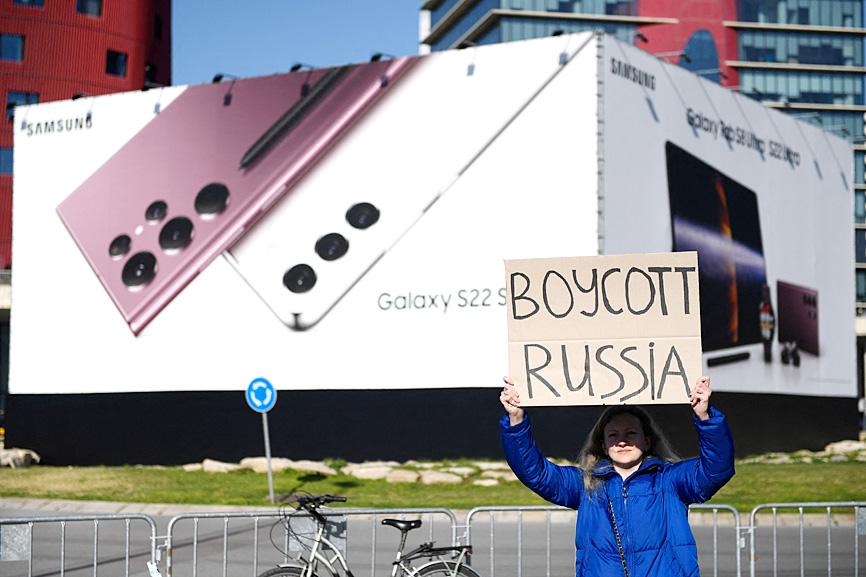Global smartphone production is expected to grow at a slower annual rate of 2.5 percent this year due to the sluggish seasonal demand in the first quarter, Russia’s invasion of Ukraine and COVID-19-related lockdowns of Chinese cities, market researcher TrendForce Corp (集邦科技) said on Friday.
Production is forecast to reach 1.366 billion units this year, down from the previous estimate of 1.38 billion units, the Taipei-based researcher said in a report.
However, as COVID-19-induced disruptions and semiconductor shortages linger, coupled with concerns about inflation and energy supply, smartphone production might be subject to further downward revisions later, it said.

Photo: AFP
“There are two key observations regarding the effects of the war on the smartphone market: First, brand sales have been suspended or have dropped sharply. Second, the war has exacerbated global inflation, which is strongly affecting energy and food prices in particular, and is rapidly spreading from Europe to the world,” the report said.
Mobile phone sales in Russia and Ukraine jointly account for approximately 3 to 4 percent of the global market, TrendForce data showed.
Eighty-five percent of sales in the two countries are in Russia, with Samsung Electronics Co, Xiaomi Corp (小米) and Apple Inc being the top three brands in the country, the data showed.
Samsung and Apple have announced the suspension of all exports to Russia, and it remains to be seen whether Chinese brands, including Xiaomi and Oppo Mobile Telecommunications Corp (歐珀), would be able to fill the void left by those two global brands in the short term, it said.
“If the war can be brought under control before the end of April, estimated impact on the smartphone market in 2022 will be approximately 20 million units,” the report said.
TrendForce said rising inflation would have an adverse effect on people’s disposable income, which would likely prolong the replacement cycle in the smartphone market.
“Due to inflation’s broad and profound influence, it is not yet possible to determine the extent of its effect on the global smartphone market, but there is indeed a high risk of downward revisions in the future,” the report said.
TrendForce believes that the COVID-19 pandemic remains a key factor to watch for in the smartphone market this year, especially in China, which continues to follow a “zero COVID-19” strategy.
“China, the world’s largest smartphone consumer market, is still adopting a dynamic zero COVID-19 policy. Not only will this policy exacerbate labor and material shortages in the intricate smartphone supply chain, pandemic prevention activities will also throw cold water on demand,” the report said.
As a result, China’s smartphone shipments would decline 7.7 percent annually to 300 million units this year from 325 million units last year, TrendForce said, adding that the possibility of a continued downturn cannot be ruled out.

GROWING OWINGS: While Luxembourg and China swapped the top three spots, the US continued to be the largest exposure for Taiwan for the 41st consecutive quarter The US remained the largest debtor nation to Taiwan’s banking sector for the 41st consecutive quarter at the end of September, after local banks’ exposure to the US market rose more than 2 percent from three months earlier, the central bank said. Exposure to the US increased to US$198.896 billion, up US$4.026 billion, or 2.07 percent, from US$194.87 billion in the previous quarter, data released by the central bank showed on Friday. Of the increase, about US$1.4 billion came from banks’ investments in securitized products and interbank loans in the US, while another US$2.6 billion stemmed from trust assets, including mutual funds,

AI TALENT: No financial details were released about the deal, in which top Groq executives, including its CEO, would join Nvidia to help advance the technology Nvidia Corp has agreed to a licensing deal with artificial intelligence (AI) start-up Groq, furthering its investments in companies connected to the AI boom and gaining the right to add a new type of technology to its products. The world’s largest publicly traded company has paid for the right to use Groq’s technology and is to integrate its chip design into future products. Some of the start-up’s executives are leaving to join Nvidia to help with that effort, the companies said. Groq would continue as an independent company with a new chief executive, it said on Wednesday in a post on its Web

Even as the US is embarked on a bitter rivalry with China over the deployment of artificial intelligence (AI), Chinese technology is quietly making inroads into the US market. Despite considerable geopolitical tensions, Chinese open-source AI models are winning over a growing number of programmers and companies in the US. These are different from the closed generative AI models that have become household names — ChatGPT-maker OpenAI or Google’s Gemini — whose inner workings are fiercely protected. In contrast, “open” models offered by many Chinese rivals, from Alibaba (阿里巴巴) to DeepSeek (深度求索), allow programmers to customize parts of the software to suit their

JOINT EFFORTS: MediaTek would partner with Denso to develop custom chips to support the car-part specialist company’s driver-assist systems in an expanding market MediaTek Inc (聯發科), the world’s largest mobile phone chip designer, yesterday said it is working closely with Japan’s Denso Corp to build a custom automotive system-on-chip (SoC) solution tailored for advanced driver-assistance systems and cockpit systems, adding another customer to its new application-specific IC (ASIC) business. This effort merges Denso’s automotive-grade safety expertise and deep vehicle integration with MediaTek’s technologies cultivated through the development of Media- Tek’s Dimensity AX, leveraging efficient, high-performance SoCs and artificial intelligence (AI) capabilities to offer a scalable, production-ready platform for next-generation driver assistance, the company said in a statement yesterday. “Through this collaboration, we are bringing two